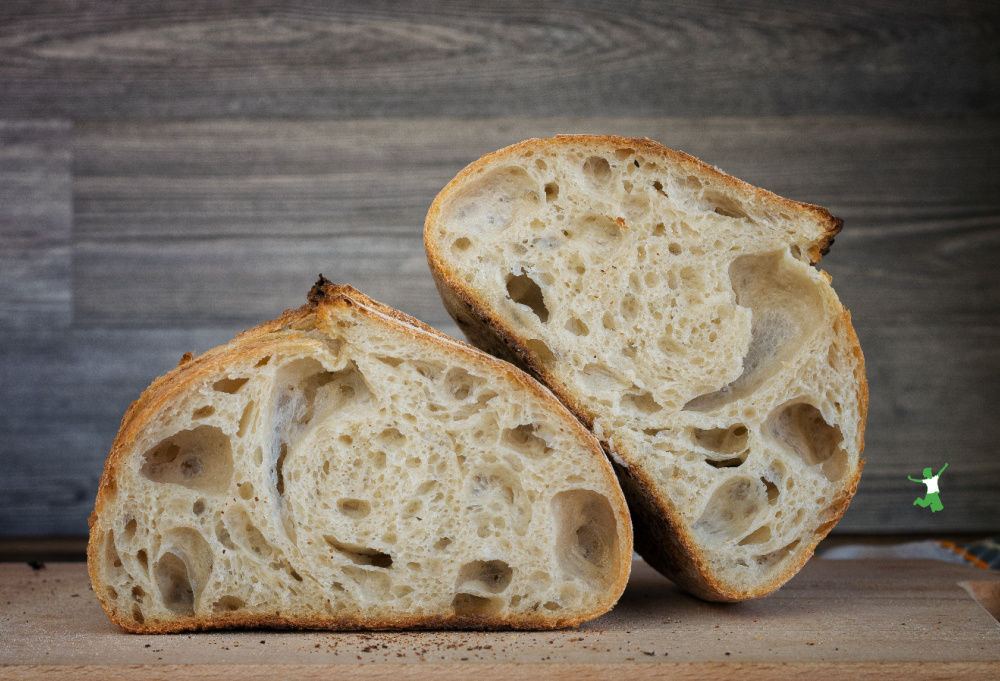Table of Contents[Hide][Show]
Research suggests that people with celiac disease tolerate sourdough bread where the dough is fermented with a specialized sourdough starter in accordance with traditional methods.

Buyer beware! Most breads labeled as “sourdough” on the market today are anything but…
These fake sourdough breads typically contain yeast and/or a sweetener.
This is an easy giveaway clue that the bread is a phony and should be avoided if one seeks a traditionally baked loaf.
Baker’s Yeast Is Not Traditional
When baker’s yeast was first introduced in France as an alternative to sourdough starter in the mid-1600s, it was strongly rejected!
The scientist-noblemen of the day knew that it would negatively impact people’s health. When the Faculty of Medicine decided to formally examine the question, they banned its use. (1)
True sourdough bread does not contain baker’s yeast. Instead, a Lactobacilli-based starter culture is used.
In addition, authentic sourdough is baked at a lower temperature for a longer period of time.
These methods protect the integrity of the cereal grains and preserve nutritional value.
What’s more, anti-nutrients such as phytic acid are eliminated, and gluten, that very difficult-to-digest plant protein, is significantly broken down.
As a practical bonus, sourdough bread stays fresh longer than yeasted bread.
Despite the initial rejection of baker’s yeast, the convenience aspect of quick-rise yeasted loaves resulted in widespread adoption over the last century.
It is no surprise, then, that the skyrocketing cases of gluten intolerance and celiac disease have risen in lockstep over the decades.
Why did pre-industrialized people groups consume gluten-containing breads with no digestive difficulty whatsoever?
Could it be that the traditional preparation methods were somehow protective?
Sourdough and Celiac
The peer-reviewed Journal of Applied and Environmental Microbiology researched this very question, publishing a study conducted in Europe that examined how celiacs tolerate true sourdough bread. (2)
Seventeen people suffering from celiac disease were given 2 grams of gluten-containing bread risen with either baker’s yeast or a Lactobacilli culture.
Thirteen of the seventeen participants showed negative changes in intestinal permeability consistent with celiac disease. Four participants did not show any negative changes.
Then, all the study participants were given true sourdough bread fermented with a special Lactobacilli culture able to break down the primary amino acid building block that causes an immune response in people with celiac.
None of the study participants showed any negative changes in their intestinal permeability after consuming the bread baked using 30% wheat flour and a mix of oat, millet, and buckwheat flour.
The researchers’ conclusions were summarized as follows:
These results showed that a bread biotechnology that uses selected lactobacilli, nontoxic flours, and a long fermentation time is a novel tool for decreasing the level of gluten intolerance in humans. (3)
What I find interesting about the study is that even when the people who consumed the wheat bread baked with either baker’s yeast or a normal Lactobacilli culture, four (nearly one-quarter) did not show any negative changes to their baseline values of intestinal permeability.
Did these people consume bread raised with a normal sourdough culture?
If so, perhaps even regular sourdough cultures would be sufficient for some celiacs to consume.
Certainly, most with simple gluten intolerance would find true sourdough bread to be easily consumed with no digestive distress.
It seems that the noblemen in the court of Louis XIV of France had it right all along.
Abandoning the traditional methods of bread preparation in favor of baker’s yeast would have disastrous effects on people’s health.
Little did they know that their wisdom several centuries later would be termed “novel” by scientists in the biotechnology industry!
(1) History of Baker’s Yeast
(2, 3) Study Finds Wheat-based Sourdough Bread Started with Selected Lactobacilli is Tolerated by Celiac Disease Patients
More Information
No-Knead Einkorn Sourdough Bread
The Good Gluten You Can Probably Eat Just Fine
The Real Reason Wheat is Toxic (It’s Not the Gluten)








Great article! I always wondered about sourdough and its impact on those with celiac disease. Your explanation on fermentation and gluten content was really helpful. I appreciate the tips on how to choose safe options!
Thank you for shedding light on this topic! It’s fascinating to learn about the fermentation process and its impact on gluten. As someone with celiac disease, I’m always searching for safe alternatives, and your insights on sourdough are very helpful. I’ll definitely look for gluten-free sourdough options now!